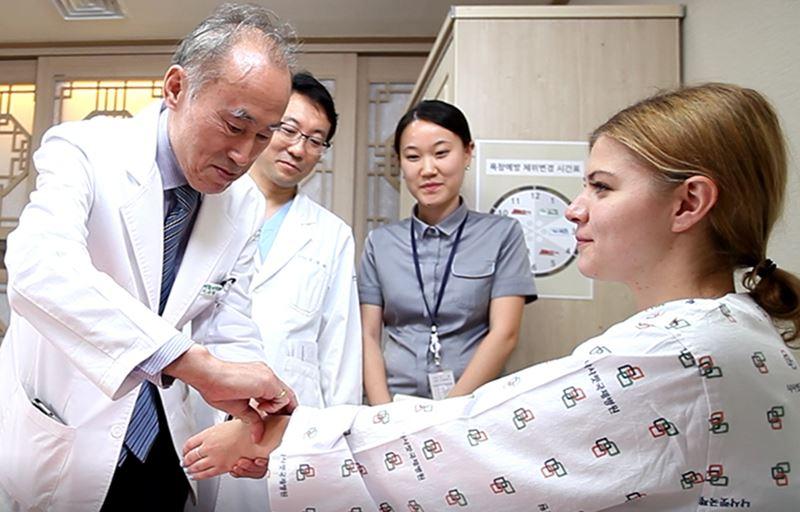Surge in Foreign Patients Seeking Medical Care in South Korea

On June 16, at Samsung Medical Center in Gangnam, Seoul, Professor Kim Ji-woon, a specialist in internal medicine, attended to a Russian patient. The number of foreign patients visiting South Korea has doubled in just one year, with significant increases from Mongolia and Russia, particularly for essential medical services like internal medicine.
A 63-year-old Mongolian man underwent a liver transplant at Asan Medical Center in January after his health deteriorated due to chronic hepatitis D, which was diagnosed in 2022. He received a liver donation from his son and has since recovered. Meanwhile, a 5-year-old Russian boy diagnosed with a malignant brain tumor received proton therapy at Samsung Medical Center last December after failing to improve with radiation treatment in Russia.
In 2022, South Korea welcomed 1.17 million foreign patients, nearly doubling from 610,000 in 2023. This figure represents a 140% increase compared to 490,000 in 2019, prior to the pandemic. While many Japanese and Chinese patients seek cosmetic and dermatological treatments, there is a notable rise in patients from essential medical fields as well. Experts predict that the number of foreign patients could reach 1.5 million this year, with a steady influx from countries beyond Japan and China.
The financial expenditure by foreign patients has also surged. According to the Korea Tourism Organization's data lab, foreign medical spending from January to May 2023 reached 714.5 billion KRW, a 74.9% increase from 408.4 billion KRW during the same period last year. The number of transactions rose from 991,057 to 1,492,354, marking a 50.5% increase, with the average payment per transaction rising by 16% from 412,000 KRW to 478,000 KRW. Medical professionals attribute this growth to the rising popularity of K-pop and the Korean Wave, which has drawn attention to 'K-Medical' services.
The medical community is particularly focused on patients from Mongolia and Russia. The number of Mongolian patients peaked at 25,731 last year after a decline during the pandemic, while Russian patients increased to 16,622 in 2022 from a low of around 6,000 during 2020-2021. Despite the ongoing Russia-Ukraine conflict, the trend of Russian patients seeking treatment in South Korea is evident.
In terms of medical specialties, internal medicine is the most sought-after field among Mongolian and Russian patients, contrasting with Japanese and Chinese patients who primarily seek dermatology and plastic surgery. Many Mongolian and Russian patients come to South Korea for severe conditions like cancer or organ transplants that are difficult to treat locally. The preference for South Korean hospitals is largely due to the advanced medical technology and infrastructure available. A representative from a general hospital noted that while many foreign patients previously sought health check-ups or cosmetic procedures, there has been a noticeable increase in severe cases since 2023.
Interestingly, not only the wealthy are opting for medical tourism in South Korea; some patients are selling their homes or raising funds to afford treatment. Recently, South Korean hospitals ranked highly in the '2025 Asia-Pacific's Best Specialized Hospitals' list by Newsweek, excelling in essential medical fields such as oncology, cardiology, and endocrinology. A representative from a university hospital in Seoul mentioned that foreign patients often compare the quality of medical services and care when choosing overseas treatment, with some Russians initially considering Turkey or Israel before opting for South Korea due to better treatment prospects.
Mongolian patients are willing to navigate stringent visa requirements to access medical care in South Korea, which include depositing over 10 million KRW for treatment or presenting a surgery reservation. The South Korean government maintains strict controls to prevent illegal stays. A representative from a large hospital in Seoul stated that despite these high barriers, Mongolian patients are genuinely in urgent need of medical care. Russian patients often face challenges using credit cards due to international sanctions, leading them to remit payments through banks in third countries.
Hospitals are actively working to attract foreign patients, who must cover all medical expenses as they are not enrolled in the national health insurance system. According to the Korea Health Industry Development Institute, hospitals set their own fees for foreign patients, similar to the structure for non-covered services for locals. A representative from a university hospital in Seoul noted that foreign patients may end up paying two to three times more than domestic patients due to additional costs for translation and various services.
As the number of Mongolian and Russian patients rises, more hospitals are hiring dedicated coordinators to assist foreign patients with everything from appointment scheduling to airport pickups and translation services. All of the 'Big 5' hospitals have coordinators for Mongolian and Russian patients, and smaller clinics are also expanding their coordinator teams. Severance Hospital employs two coordinators for each of these nationalities, more than the one each for Chinese and Japanese patients. Chung-Ang University Hospital, which previously only had coordinators for English and Russian, recently hired a coordinator specifically for Mongolian patients in March. Medical professionals emphasize that patient satisfaction significantly depends on effective communication during the examination and treatment process, prompting more hospitals to establish dedicated teams of coordinators.
What do you think?
0 reactions





